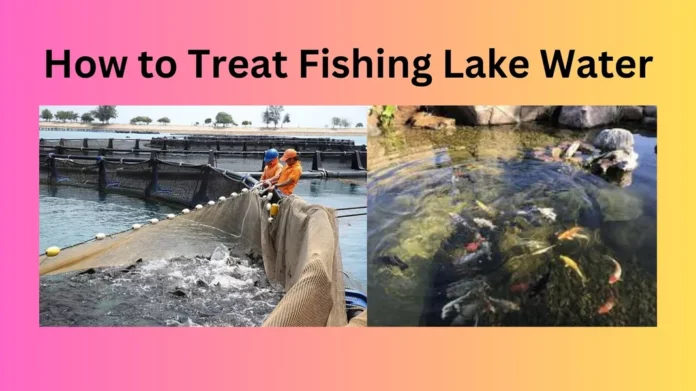Fishing is a beloved pastime that brings solace and thrill to anglers. Whether you’re a seasoned pro or a newbie, the quality of the fishing experience largely depends on the condition of the water.
In this comprehensive guide, we will delve into the intricacies of treating fishing lake water, ensuring that your favorite fishing spot remains clean, healthy, and teeming with fish.
From understanding water quality issues to effective treatments, we’ll cover it all. So, grab your rod, put on your fishing hat, and let’s explore the art of treating fishing lake water!
The Importance of Water Quality in Fishing
Before we dive into the treatments, let’s understand why water quality is essential in fishing. The cleanliness and balance of the lake’s ecosystem play a pivotal role in fish health and abundance. Poor water quality can lead to the decline of fish populations and a disappointing fishing experience.
Common Water Quality Issues
Understanding the problems is the first step in treating fishing lake water. Here are the most common water quality issues:
- Algae Blooms: Algae can disrupt the balance of a lake’s ecosystem, causing water to become cloudy and fish to suffer due to low oxygen levels.
- Weed Overgrowth: Excessive aquatic weed growth can make fishing difficult and affect the overall health of the lake.
- Muddy Waters: Silt and sediment can cloud the water, making it unattractive to fish and decreasing their visibility.
How to Test Water Quality
To address these issues, you need to first evaluate the current state of your fishing lake’s water quality. This can be done by testing the water. Many test kits are available for purchase or can be obtained through local environmental agencies.
Parameters to Test
- pH Levels: pH levels can affect the survival and growth of fish.
- Water Temperature: Temperature influences the fish’s metabolism and behavior.
- Dissolved Oxygen: Adequate oxygen levels are crucial for fish survival.
- Nutrient Levels: High nutrient levels can lead to algae blooms.
- Transparency: Clear water is ideal for fishing.
Effective Water Treatments
Now that you know the issues and have tested the water, it’s time to explore effective treatments for your fishing lake:
Aeration
Aeration involves adding oxygen to the water to improve fish habitat and discourage the growth of harmful algae. It can be achieved through diffusers, fountains, or paddlewheel aerators.
Algaecides and Herbicides
These are chemicals used to control algae and aquatic weeds. It’s essential to use them judiciously, following the manufacturer’s instructions, to prevent harm to fish and other aquatic life.
Silt Removal
To address muddy waters, silt removal methods like dredging and sediment basins can be employed.
Biological Control
Introducing natural predators of pests, like certain fish species, can help control unwanted aquatic life.
Nutrient Reduction
Reducing the nutrient levels in the water can prevent the growth of algae. This can be done through buffer zones, wetlands, and nutrient management practices.
Regular Maintenance
Treating fishing lake water isn’t a one-time task. Regular maintenance is key to preserving water quality. Ensure that you test water quality periodically, especially after heavy rain or changes in the environment.
Conclusion
In the pursuit of an exceptional fishing experience, maintaining the quality of your fishing lake water is paramount. By addressing common water quality issues, conducting regular tests, and employing effective treatments, you can ensure your fishing lake remains a thriving ecosystem. Clean, healthy water ensures the fish are abundant, making your fishing trips more enjoyable.
FAQs About Treating Fishing Lake Water
FAQ 1: Can I use regular pond treatments for my fishing lake?
Yes, many pond treatments are suitable for fishing lakes. However, it’s crucial to choose the right products and dosages according to the lake’s specific needs.
FAQ 2: Is aeration necessary for all fishing lakes?
Aeration is generally beneficial for most fishing lakes as it improves oxygen levels and fish habitat. However, the need for aeration may vary depending on the lake’s size and environmental conditions.
FAQ 3: Are there natural methods to control algae and weeds?
Yes, introducing natural predators or using biological controls like grass carp can help manage algae and aquatic weed growth in an eco-friendly way.
FAQ 4: How often should I test my fishing lake’s water quality?
Testing should be conducted periodically, with the frequency depending on the lake’s characteristics. A good rule of thumb is to test at least once a season and after significant environmental changes.
FAQ 5: Can I use homemade remedies to treat my fishing lake water?
While some homemade solutions may work for minor issues, it’s advisable to consult with experts and use proven treatments for the long-term health of your fishing lake.
With these methods and tips, you’ll be well-equipped to treat your fishing lake water effectively, ensuring memorable and bountiful fishing adventures for years to come. Happy fishing!















